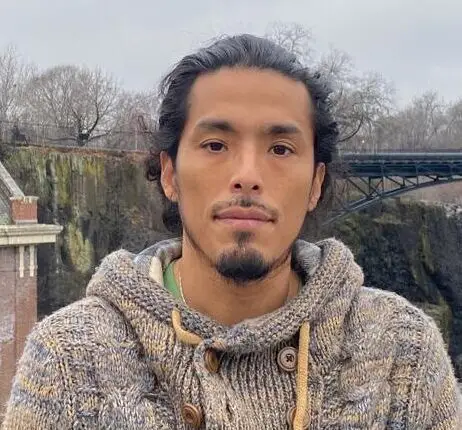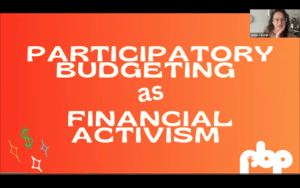This past October, I had the opportunity to attend the second World Social Forum on Transformative Economies (WSFTE). The 2024 WSFTE was held in Cali, Colombia from October 20th to 22nd. It was an international gathering that brought together activists from 16 countries and counted on the synchronous and asynchronous participation of dozens of organizations from around the globe.
The WSFTE convened practitioners who are engaging in alternatives to the capitalist world system. We came together to share our experiences in grassroots communities as we sought to collectively reimagine how we conceive of economic life beyond for-profit markets and extractivism.

In its second convening, the quadrennial WSFTE once again created an “open space of meetings about transformative economies, to intensify reflection, to carry out a democratic debate of ideas, to elaborate proposals, to establish an exchange of experiences and to articulate effective actions, establishing epistemological bridges based on trust and love, pointing out the role of transformative economies in the construction of a world where several worlds, other worlds, different multicultural worlds coexist.” This year, it was intentionally held during the opening days of the COP 16 UN conference on biodiversity, a narrowly focused conference distinct from the more well known COP gatherings on climate. The intention was to provide an alternative space outside of the greenwashing that typically takes place at these UN conferences, whereby transnational institutions and governments collude to advance a profit-driven agenda that propose meek offsets, maintaining the extractive economic systems driving climate change in place.
The WSFTE is a branch of the World Social Forum and was inspired by the World Social Forum’s Charter of Principles. The World Social Forum can be thought of as a movement of movements, born out of anti-globalization networks at the turn of the 21st century that convened social movements advocating for a world beyond extractive capitalism.
PBP’s own lineage and the participatory budgeting process can be traced back through to the World Social Forum. The first PB process was held in Porto Alegre, Brasil in 1989, soon after the re-establishment of democracy in the country that followed 21 years of military dictatorship. One of the key allies who supported the initial PB proposal in Porto Alegre was the MST, Movimento dos Trabalhadores Rurais Sem Terras (MST) or Landless Peasant Movement. A few years after the successful implementation of PB in Porto Alegre, the MST along with numerous other grassroot organizations began to think globally, brainstorming ways to counter the growing corporatism and extractive policies promoted by global banking institutions.
It was this critical and collective imaginary that led to one of the first institutions of alternative globalization, the World Social Forum. The first World Social Forum was held in Porto Alegre in 2001, the same city where the first PB was held! The World Social Forum was conceived of as a space to bring together alternative movements, in contrast to the global economic forums organized by elite oligarchs and went on to introduce many concepts to the world such as participatory budgeting.

The 2024 WSFTE was held across three days in Cali, Colombia and was structured around several tracks and discussion circles. The discussion circles were titled, Body, Territory and Health; Economies of Sovereign Care and Food Sovereignty; Agroecology and Water; Transition and Civilizational Crisis; Economy Curriculums and Popular and Communitarian Education. I attended the Popular and Communitarian Education discussion circle that held two general meetings.
During these discussion circles I heard from participants from all over the Americas, as well as Asia and Africa, all of whom shared how they were working in communities to forge economies for life. Under the theme of weavings, we brought together shared experiences on developing critical alternative economies that went beyond the financial and profit-driven motives. We discussed solidarity economies, economies of care, and everyday practices that brought out the eco part of the economy. We based our learning on the Freirean model, bringing in experiences from the margins and relying on otherwise mundane activities such as weaving as learning tools.
It was in this space that I shared my experience with PB and the work I have just started as the Curriculum Development Specialist for PBP. During the discussion space I shared how the seeds planted in Porto Alegre in the late 20th century have flourished around the globe including the United States, where the first PB project took place in Chicago in 2009. The participants were eager to hear how this radical experimentation in direct democracy was received in the States. While there were many success stories to share, I also shared some of the ongoing struggles with implementing PB, particularly the pushback PB initiatives have received from some government officials.
As the Curriculum Development Specialist for PBP, I greatly appreciated hearing how communities from across Latin America were developing place-specific curriculums. Their emphasis on the “popular,” meaning accessible and critical curricula, was developed not simply for the sake of educating people but to support the numerous social struggles on the ground. More so, they drew much from Indigenous and Black politics, most notably in decentering the outside educator and elevating experiences and the knowledge of students as a form of collective learning.
Attending the WSFTE was a moving experience. In many ways, it was a return to the ideological home of PB, where I was reminded that transformative economies are those that “interchange necessities, and are based on solidarity and complementarity.” I return to my work at PBP inspired, bringing back a rejuvenated spirit as I pick up my work on developing the curriculum for our forthcoming training program. I carry with me the affirmations of the WSFTE, particularly the statement that we must “shape formative practices and research in associations, self-determination, and the diverse ways of organizing an anti-patriarchal, decolonial, and non-capitalist economy.” (My Translation)
The next WSFTE is scheduled to take place in 2028 in Argentina.

George Ygarza
George is a popular educator, researcher, and community organizer. George is the Curriculum Development Specialist for PBP’s Train-the-Trainer program currently in development. His work has taken him across a number of different spaces, from teaching at Ivy League institutions to facilitating peoples assemblies in his birthplace of Paterson, New Jersey. Prior to completing his PhD in Global Studies, George was a substitute teacher (later becoming a certified social studies teacher) in Paterson, where he cultivated critical learning spaces within the classroom. During this time, George was part of the NJ Grassroots collective, helping to coordinate a community garden and cycling collective in Passaic, NJ. George has since worked on producing more public-facing work, including writing op-eds on housing justice, abolition, and peoples budgets. In 2024, two of George’s major projects were published. The first, Constructing Worlds Otherwise, is a translation of reports on place-based movements in Latin America. The other is an edited toolkit on Municipalism.




